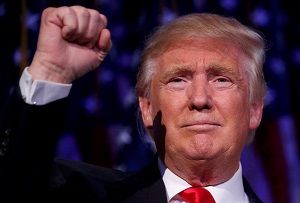The tariff debate has now firmly taken over the day-to-day agenda while asset markets are trying to work out what they should be doing.
There is no question, and I think we should be quite clear about this, that raising trade barriers do nobody any good. I am not a natural fan of Donald Trump, whether as president, hotelier or two-bit TV celebrity. I have, nevertheless, tried hard to find the good in his disruptive approach to some of the ossified structures of government that plague the US, a country of which I am inordinately fond and which I shall be visiting a month from now.
But when it comes to the issue of trade I struggle to understand not only where he comes from but where he finds the support. Does he truly believe that “saving the US steel industry from unfair competition” by raising tariffs will suddenly see blast furnaces pop out of the ground in Pittsburg and tens of thousands of Americans don blue overalls and hard hats and return to casting girders and rolling sheet metal? What about the high quality specialist metals that US industry needs but which it cannot produce itself? Who, other than foreign finished goods manufacturers, benefits from being able to buy semi-finished goods from China cheaper than their American peers who have an added tariff hurdle to leap over?
The lack of understanding that even the mighty US is just a single piece in the jigsaw of global trade is worrying but what should concern us more is that there are still so many people in America who haven’t grasped that simple fact.
Hannah Arendt
Today is International Women’s Day and may I suggest picking up the works of one of the 20th century’s greatest thinkers and political philosophers, Hannah Arendt. Arendt’s work on totalitarianism towers above much other work on the subject because it is brilliant, not because she was a woman. I alluded in Tuesday’s column to rising comparisons to the 1920s and 1930s and the responses I have received indicate that that observation might not be entirely without merit. Perhaps it’s also time to dust down that old copy of “1984”.
One might note that the Wall Street crash of 1929 and the Great Depression followed a bout of protectionism and the vain belief that ring-fencing domestic markets can lead to lasting positive outcomes. Deregulation and lowering trade barriers, an ongoing process since the end of World War II, albeit it with the odd wobbles, lies, deceptions, double-dealings and set-backs, has served us well and we must defend these advancements vigorously. I do hope Michel Barnier is listening; his rhetoric towards the UK is in some ways not much different than that of the Donald towards the rest of the world.
This morning’s news is that Trump’s most recent ramblings tell us that Mexico and Canada might be exempted from the steel tariffs as they are both close allies and his tariff policy is supposed to be based on the national defence exemption clause to the WTO rules. If that is the case, then the imposition of penal duties on any goods from any Nato or Asean country find themselves on wobbly ground too.
Correction fluid
Risk asset prices are now due a correction to the upside and the crack in the tariff dyke should bring buyers back in droves. Whether a recovery in markets is sustainable or not is a different matter. The dark shadow of rising rates remains over all asset prices. Federal Reserve president Jay Powell has hinted at faster increases in the cost of money than the curve had priced in but I remain sceptical. Governments in general, and not only that of the US, are carrying more debt than ever and the impact on their finances from a rise in the cost of money has never been higher either. If debt is 100% of GDP, then a 1% rise in the cost of refinancing the debt stock chews up 1% of GDP or about 3% of fiscal revenue, realistically assuming the tax take to be about one third of GDP. That they simply can’t afford. The delayed effect in a rising interest rate scenario on the full debt stock is considerable but not to be forgotten. It still looks as though Janet Yellen missed a few opportunities to tighten earlier in the cycle and Jay Powell could find himself trying to close the stable door after the horse has bolted and, to mix my metaphors, with a very empty punch bowl standing in the middle of the dance floor.
Today also brings the ECB central council together. St Mario is in holding mode and the global trade dynamics will most probably cause him to be even more guarded in his post-meeting comments than he already usually is. In other words, this is going to be the sort of non-event which makes normal non-events look exciting. The fact that the central bank of the largest economic block in the world is totally impotent to do anything other than buy obscene amounts of vastly overpriced corporate bonds, thus destroying its own citizens’ savings and beggaring its pensioners, speaks volumes. Maybe central banks have outlived their usefulness in their current form and a fundamental rethink is called for but that’s a subject for another day.

